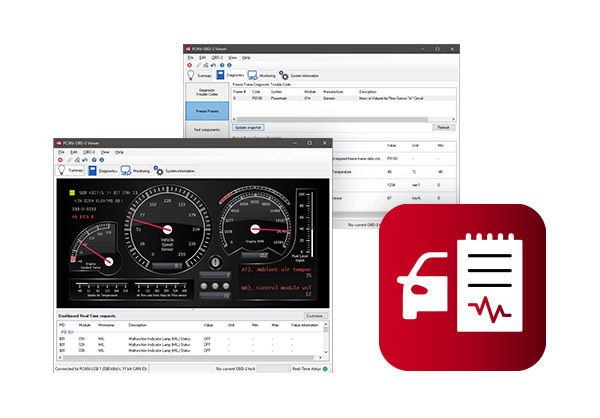Blog
Recent Posts
Free-of-Charge OBD-II Viewer Windows Software and Application Programming Interface (API)
Posted by on
 PEAK Systems has announced the revised version 1.2 of its free-of-charge Windows software PCAN-OBD-2, an OBD-II Viewer based on their OBD-2-API (Application Programming Interface).
PEAK Systems has announced the revised version 1.2 of its free-of-charge Windows software PCAN-OBD-2, an OBD-II Viewer based on their OBD-2-API (Application Programming Interface).
The software allows engineers to develop applications based on the OBD-II (Onboard Diagnostics) communication standard. The Windows software and the API work with all PEAK Systems CAN Bus interfaces. OBD-II is a standard specifying a diagnostic connector and its pinout, the electrical signaling protocols, the message format, a candidate list of vehicle parameters to be monitored, and information on encoding the data for the parameters. The OBD communication protocol is defined in the SAE J1979 and ISO 15031-5 Standards, while ISO 15765-4 specifies the CAN Bus implementation. OBD-II is a client-server-oriented protocol.
The PCAN-OBD-2 Viewer supports all OBD-II services transmitted via CAN Bus. A virtual cockpit displays the data graphically in analog and digital instruments. Optionally, it displays individual parameters as graphs, including exporting charts and data sets. Furthermore, it shows diagnostic trouble codes (DTCs) and available test results.
Features
- On-board diagnostics according to the OBD-2 Standard (ISO 15765-4)
- Physical communication via CAN Bus using a CAN Bus interface of the PCAN series
- Support of all OBD-2 services that can be transmitted with CAN Bus
- Configurable graphical data representation on analog and digital instruments in a virtual cockpit
- Saving and loading of configurations
- Display of Diagnostic Trouble Codes (DTCs) and available test results
- Reading of data that is recorded if an error occurs (Freeze Frames)
- Listing emission-related data. Optional display of individual parameters as a graph
- Exporting graphs and records of the OBD-2 communication
Teensy 4.1 Triple CAN Bus Board with 240x240 LCD and Ethernet
This is a Teensy 4.1 board with triple CAN Bus connections, two CAN 2.0B and one CAN FD and an Ethernet magjack. It can be powered by an external +12 VDC with reverse voltage protection. Included is also a 240x240 wide-angle IPS TFT LCD.
The Teensy 4.1 is an Arduino-compatible board with an Arm Cortex-M7 microcontroller running at 600 MHz. In addition, the board is compatible with the Arduino IDE and the Arduino library.
 Loading... Please wait...
Loading... Please wait...

